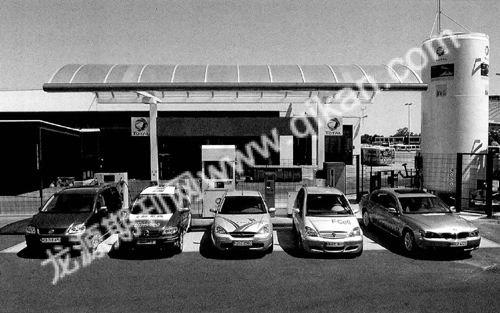Total Encounters Waterloo in China
2009-09-30
Since Totals first natural gas project in China was launched in 2006, it has not seen any gains. At first it had a failure in Dazhou, Sichuan; and then it was trapped in an adversary situation in Guangan, Sichuan.
In middle April, a team from Total frequently met and talked with the government leaders of Sichuan Province, with the hope of winning the bid of the project of producing olefin from natural gas in Guangyuan, Sichuan.
However, Totals third trial in China may still end with a failure.
China Chengda Engineering Co., Ltd formed a research team to study the utilization distribution of natural gas in southeastern Sichuan. On April 21, its director Yu Changchang said that Total was restricted by the national natural gas industry policies and the limitation or prohibition in the natural gas projects.

Whats behind the national natural gas policies is the insufficiency in the natural gas consumption in China. Those projects usually consume such a large amount of natural gas that the National Development and Reform Commission (NDRC) are reluctant to give the approvals. Furthermore, the precious natural gas resources are in the hand of the two domestic oil and gas giants – China National Petroleum Corporation (CPNC) and China Petroleum & Chemical Corporation (Sinopec).
Failures in Sichuan
Actually, Total responded very quickly to the discovery of largest marine facies gas field in China – Puguang Gas Field.
No other international oil and gas giants arrived earlier than Total in Puguang Gas Field, whose reserve is estimated at 660 billion cubic meters. Total, also came to this gas field most frequently and stayed here for the longest while.
In 2006, Puguang Gas Field was discovered. At that time, the government of Dazhou, where the gas field was based, for the first time held the high lever forum for natural gas energy. This forum is held in the Great Hall of the People, Beijing. Though some international giants like Shell and Exxonmobil Chemical attended this forum. Few of them are interested in this field, which is based in Dazhou with more than a-thousand-mile distance away from Beijing.

Total, unlike the other international oil and gas giants, sent its regional director of China to Dazhou for four times.
“Total planned to invest 500 million US dollars, starting a project in Dazhou which can produce 1 million tons of dimethyl ether from natural gas each year. If this project is finished, it will be the largest dimethyl ether manufacturing base in the world,” said a government official of Dazhiou.
Dimethyl ether is a kind of gas which is convenient to be liquefied and transported. It can replace the liquefied petroleum gas in many aspects.

“Total has succeeded in many experiments of mixing dimethyl ether with liquefied petroleum gas. It has technological advantage,” said Yu Changchang on April 21. As the world leading gas manufacturer, Total has an 80-thousand-ton dimethyl ether pilot plant in Hakkaido, Japan. Obviously, Total wants to turn Puguang Gas Field into its main battlefield of producing dimethyl ether.
Therefore, Total entrusted China Chengda Engineering Co., Ltd to conduct the feasibility study. The decision was planned to be formed in April 2007.
However, two years has passed. The 30-square-kilometer natural gas chemical industrial park in Dazhou has never seen the project of Total.
The one who defeated Total was Dazhou Steel Group – a local enterprise with fewer advantages in fame, strength, capital and technology compared with Total.
According to the director, Dazhou Steel Group has invested 1.1 billion yuan (USD 161.3 million) in producing dimethyl ether. The annual output is 300 thousand tons. The project was launched in 2007 and it will be put into production in this year.
With stronger power and more advanced technology, why Total failed in getting the approval to produce dimethyl ether in China?
“The main reason is the restriction from the industry policy of China. The government prohibits construction of new projects or expansion of existing projects of producing dimethyl ether from natural gas,” said the government official mentioned above. China would rather produce dimethyl ether from coal than from natural gas because the cost performance of the former way is better.
The industry policy refers to the Policy of Utilizing Natural Gas issued by the NDRC in August 2007. Due to the protruding contradiction between the supply and demand of natural gas, China has to import a lot of natural gas every year. Therefore, the government categorized the use of natural gas into four aspects – preferable, allowable, restrictive and prohibitive. The civilian use of natural gas must be guaranteed.
“While Dazhou Steel Group is different because it produces dimethyl ether from the coal oven gas and rotary oven gas coming from the process of steel-making. Not only the project is approved, but also Dazhou Steel Group got a 50-million-yuan award of energy-saving and emission-reduction,” said a director of Dazhou Steel Group.
“If Totals project were built, it would cost 1.4 billion cubic meters of natural gas a year, taking nearly a half of the yearly amount of natural gas transported to Dazhou from East Sichuan. The yearly amount of natural gas in Sichuan Province is only 10 billion cubic meters. With the condition that the civilian use of natural gas must be guaranteed, very little amount of natural gas can be available in producing dimethyl ether,” said Yu Changchang.
However, Total didnt foresee that it had another failure in Guangan, another city in Sichuan.
In 2007, Total sent its General Representative of Northeast Asia to Guangan where a gas field with more than 100 billion cubic meters reserve was discovered by CPNC.
“Total planned to invest in the project which can produce 1.2 million tons of dimethyl ether from natural gas each year. But that doesnt conform to the national industry policy either. So the project was not approved,” said a government official of Guangan.
There is also the same problem of insufficient gas sources. “We have got 600 million cubic meters of natural gas to produce ethyne, but this is far away from the demand of Total. And CPNC didnt agree to give so much gas,” said the government official.
Depression in Guangyuan
After the two failures in Sichuan, Total moved its focus on Guangyuan, another city in Sichuan.
This time, Total aims to produce olefin instead of dimethyl ether from natural gas.
“Total came here for twice. Last year, Francois Issard, President of Exploration & Production Department of Total China led a five-person group to our city. On January 14, they came here again. Total wants to build a project with an annual output of 1 million tons of olefin in Guangyuan and plans to have the cooperation done in the first half of this year,” said Zhao Ping, Deputy Director of Guangyuan Municipal Investment Recruitment Bureau.
Olefin is also what Total is good at. It has a pilot plant of olefin in Belgium.
But Totals way of investment is as thorny as before. The top management of Total visited the high-level leaders of Sichuan Province. But no expected result was acquired. Yu Changchang said that this time the industry policy also plays a negative role in this project. Though olefin is the downstream product, the manufacturing of olefin only can be available after producing methanol from natural gas. This also faces the restriction from the industry policy of China about producing methanol from natural gas. Actually, a saying came out at the end of April that the Ministry of Industry and Information Technology is working on a nationwide planning about the olefin. Totals olefin project, which has to wait for being approved by the NDRC, may not get the pass.
Another hurdle in the project, according to Yu Changchang, is where Total gets the gas. To produce 1 million tons of olefin may need at least 2.4 billion cubic meters of natural gas. Though it is said that the gas field in Gungyuan also has a large reserve (the reserve is initially estimated at 5 trillion cubic meters), the daily output of 300 thousand cubic meters in Guangyuan can not satisfy the demand of Total.
“When talking with the government officials of Sichuan, Total said that it wanted to take part in the exploration of oil and gas. However, this matters the national energy safety strategy so the Sichuan provincial government has no right to determine it,” said Zhao Ping. Therefore, Totals olefin project has to be postponed.
Hope Still Exists
Total remains silent on its failure in China. On April 22, the spokesman for Total said that the board chairman of Total China has not given any personal or corporate opinion about its stagnation in China.
But why Total puts so much energy in developing natural gas industry in China? “They want to offset their shortage in Chinas oil industry,” said Yu Changchang. According to him, Total has to focus on Chinas market due to the decreasing profit of upstream oil and gas products caused by financial crisis and dropping international oil price.
But China has no large oil field as those ones in Africa and Middle East. In addition, Total has worse performance in the field of downstream oil and gas products in China than the other international oil and gas giants.
For example, Totals lubricating oil is only popular in Europe. It has many fewer gas stations in China than BP and Exxonmobil Chemical. It has no large oil refinery factories in China.
So, the key to having better performance in China for Total is to fill up the empty areas of Chinas oil and gas industry. And how to get into the natural gas industry of China is the most important and urgent problem for Total to deal with. Totals choice is to cooperate with Chinas domestic oil giants, like CNPC and Sinopec.
